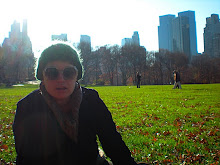an out-of-town friend who was visiting me in brooklyn recently noted that i use the g-word too many times a day. and, meeting with 2 friends from high school, i noticed that they do this too. but don't we new yorkers have good reason to be obsessed? leave your neighborhood for a few months and upon return, you may not recognize it.
when my mom moved to park slope in the '70s, she moved there because it was affordable and she was a poor artist, putting herself through brooklyn college on the small funds from her dad's child-support checks. like me, she was a brooklyn girl born and raised (i am 3rd generation), but unlike me, she had no idea of what gentrification can do. it was just beginning and she was unknowingly part of the process. the yuppie haven that is now park slope, and that my mother and i now complain wildly about, was partially her own creation. it's the now typical story-- when she moved in, it was a working-class neighborhood and folks like her were moving in- college students and artists (she was both.) we now know that those folks make an area more desirable and trendy, increasing the rents so that soon the families who lived there are forced to leave and the young folks can't afford to live there anymore either. this is the very simplified narrative anyway. but what responsibility do i have as a recent college grad, artist, and whitey? i cannot claim the ignorance that my mother has a right to.
i started this post many months ago. i've been ranting about this for years. but now, for the first time, i am looking for my own brooklyn apartment. i am not looking in park slope (couldn't afford to even if i wanted.) i am not looking in williamsburg. or bushwick. or bedstuy. i do not want to join the hoards of recent graduates from my college who are moving there-- the many hipsters who are trying on brooklyn for size along with their tight pants. at an event for graduating seniors at my college, a dean made a comment about students moving to san francisco, portland, chicago, and brooklyn. as if brooklyn was a city too, and certainly a major destination.
there are many articles about gentrification dotting new york papers these days. but most focus on older yuppies, the white families with fancy strollers who block off park slope's street corners. but what about us 20-somethings? park slope is long gone to this great gentrifying process. what about the renters on the outskirts of these neighborhoods, moving into neighborhoods where their young, single, whiteness is even more visually obvious?
what terrifies me is that we know what we're doing. last summer i met a woman who had just graduated from brandeis and was doing teach for america in a tough brooklyn school. she had grown up on the upper west side, gone to private schools her whole life. and now she was living in what used to be called sunset park and is now "south slope". she said the block she was living on was "violently gentrifying" with tangible anger from long-time hispanic residents. she knew her presence there wasn't helping. she seemed to feel bad about it. but, "what can i do?" she said. and i have heard this so many times. us recent college grads, we've studied gentrification in classes. we know how to talk about, problematize, identify oppression. and we can sometimes even recognize our part in it. we know the language but we know no action. we feel powerless to stop the systems we criticize, to extricate ourselves from them. we nestle into academicized white guilt. or maybe we just don't care? call me corny, or un-hip, but i do care. and i grew up in brooklyn. but does that matter? maybe i'm just as confused, just as helpless, white, just as much of a gentrifier as the next kid.
i told you some of the neighborhoods i'm not moving to. so where can i move? today i looked at an apartment in flatbush, not far from where i grew up and where my father still lives. a chasidic man named joe showed me the place. walking to the apartment building, he sang the praises of the neighborhood, the building. he told me about the dunkin' donuts as if it was a draw to live there. i remember when that opened and how pissed i was. "i don't like dunkin donuts," i said. he bragged about how safe the apartment building is, pointed out the security cameras multiple times. "the building is changing," he said. "we're getting rid of all the irresponsible people. people like you are moving in. i just sold a 3 bedroom to a woman just like you." (now who is people like me? how does he know what i'm like?) and when we got in the elevator, a black man got in with us. i said hi to him, and he said goodbye when he got off on the 3rd floor. as soon as the elevator door closed, joe repeated that his management company was really cleaning up the building. they want tenants like me. "so you're evicting people?" i asked. "yes," he said proudly. and when i told him i'm starting a new job, i don't have the 3 pay stubs i supposedly need for the place- "no problem," he said. so accommodating for people like me. and it was a nice apartment too.
there's so much more that can be said. for now, a small selection of some articles i've collected:
- gag-inducing article on brooklyn's changing real estate
- fascinating article about the chasids and williamsburg
- article from the viewpoint of a park slope parent
- article about youth-led anti-gentrification movements
- guitarist Mark Ribot's article on the lack of financial support for new music (an expansion of how gentrification effects nyc)
.jpg)
